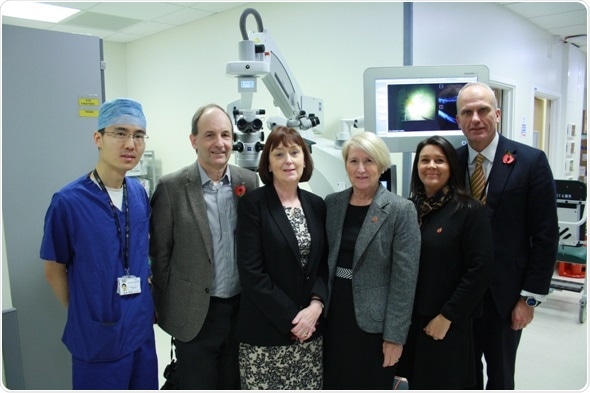Nov 11 2016
Funders help to purchase OCT microscope used in clinical trial
Following on from a successful world’s first Phase I gene therapy trial for choroideremia, Professor Robert MacLaren and his team at Oxford University and the Oxford Eye Hospital at the John Radcliffe Hospital have started a Phase II trial enrolling 30 patients.

In this trial Professor MacLaren is using an operating microscope with integrated optical coherence tomography (OCT) that will refine the surgery that is integral to the gene replacement therapy. The purchase of this vital piece of equipment called OPMI Lumera 700 Rescan is thanks to a number of funders including: Fight for Sight, Tommy Salisbury Choroideremia Fund at Fight for Sight, National Eye Research Centre, Choroideremia Research Foundation USA, Saturday Hospital Fund and benefactors of the MacLaren Group. The project has been funded by the Efficacy and Mechanism Evaluation (EME) Programme, a Medical Research Council (MRC) and NIHR partnership.
Choroideremia, is an incurable genetic condition affecting approximately 50,000 men worldwide. It is caused by a genetic fault in the REP-1 gene and gene therapy is being trialled to replace the faulty gene with a healthy one. The intraoperative OCT microscope enables surgeons to track changes in the retinal anatomy in real time and thereby permit safe and precise delivery of the gene therapy with the ultimate goal of improved vision for patients.
Paul McGuire, 45, from Billericay, was diagnosed with the condition in March 2013 and was the first patient to have the operation using the operating microscope. He said:
I can’t thank the team at Oxford enough. I’m incredibly grateful to have had the opportunity to potentially halt further deterioration in one eye and I already feel it has made a slight improvement to my vision. Having experienced first-hand the benefits of technology and the importance of eye research I will continue to fundraise for Fight for Sight and hope one day there will be a cure.
Paul along with the other patients will have visual function tests including; best corrected visual acuity, microperimetry (assesses the visual function of a specific area of the retina), and retinal sensitivity tests for comparison of baseline values conducted six months after surgery.
Professor of Ophthalmology at University of Oxford Robert MacLaren said:
On behalf of the Clinical Ophthalmology Research Group at the University of Oxford I would like to thank all its generous benefactors for assisting us in raising funds for an OCT operating microscope for the Oxford Eye Hospital. The equipment is being used in exciting new gene therapies for the treatment of patients suffering from incurable eye conditions.
By using the OCT operating microscope it allows for better and safer outcomes for patients due to more refined surgery using the microscope. If successful this trial can be translated to other conditions such as retinitis pigmentosa, which affects 1 in 4,000 people.
Dr Dolores Conroy, Director of Research at Fight for Sight said:
Professor Robert MacLaren and his team at Oxford have been making incredible breakthroughs. We were delighted to have been involved with the first phase of the clinical trial, which had promising results for patients. Having raised vital funds it has allowed a crucial piece of equipment to be purchased. It also gives patients hope that one day that could be a cure for the condition. We wish Robert and this team every success with the trial and glad we can be part of it.
A reception for benefactors who helped fundraise for the OCT microscope will be held on Tuesday 8 November at the John Radcliffe Hospital, part of Oxford University Hospitals NHS Foundation Trust.